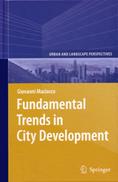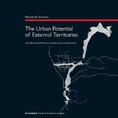landscapes agriculture premio gubbio 2018 news parks urban renewal globalization premi tesi di dottorato social practices conferences urban regeneration call for articles heritage spatial planning brownfields habitability settlements call for papers local development tools and techniques landscape planning tourism resilience fragile territories
Fundamental Trends in City Development
Giovanni Maciocco
What do phenomena like sprawl, "generic city" or "urban segregation" have in common with the concept of the city? This is not an easy question. It is nevertheless the inquiry this book is based on, mainly because of the bewilderment we feel when faced with these phenomena that are spread throughout the urban world and constitute a tall order for our concepts of the city. Expressions like "discomposed city", "generic city" and "segregated city" refer to entities that share the loss of the city as a space of communication and social interaction and as the space of the public sphere.
In order to explore what we call the city adrift, certain positions of scholars of the city are analysed, using the utopia as an analytical category and referring to three kinds - the 'conservative utopia', 'liquidatory utopia' and 'resistant utopia' - which can perhaps significantly distinguish the different positions on current spatial trends of the city and more generally the phenomena emerging in the urban world.
This book investigates how the city can be re-established as the space of dialogue and communication, how the spatial conditions of the public sphere can be created and the city retrieved, and what the features might be of a city retrieved and restored to its citizens.
The author adopts the concept of externity as an innovative element for the project for the city, a constituent feature of all those situations traditionally considered non-functional, therefore external, to our contemporary post-cities, which are consigned to us adrift through decomposition, genericity and segregation.
CONTENTS
Three Categories of Utopia
City Adrift
Conservative, Liquidatory and Resistant Utopias
The Discomposed City
The Formless City
Crisis of the Context of Proximity
Crisis of the Ethics of Proximity
Deconstruction of the Space of Proximity
The Generic City
The Revenge of Functionalism
Thematisation of the City
The City as a Simulacrum
Desired Landscapes
The Segregated City
The Urban Project of Inequality
Elitist Segregation as Global Identity
Flat Man
Reinventing the City
Externity
Recovering Sensitive Knowledge of the City
Walking is the “Speech Act” of the City
“Dynamic Traditionality” as a Requisite of Urban Innovation
Narrating the City Means Designing its Possible Future
Artists Take the City by the Hand
Horizons of Contemporary Public Space: Intermediate Spaces
Counterspace and Disenchantment with the Modern City
The “Void” and the City Project
…and the City was Born of Chaos: Designing the City at its Edges
The Territory of the City
Towards a Reinvented City
References
Index
Name Index
ABOUT THE AUTHOR:
Giovanni Maciocco is Full Professor of Town and Regional Planning, Director of the Department of Architecture and Planning and Dean of the Faculty of Architecture at the University of Sassari. He is Director of the International Laboratory on "The Environmental Project". His main field of research is urban and territorial space planning. Several of his architectural and urban space projects have been published in specialist books, international journals and publications. Among his recent works: La città in ombra, (FrancoAngeli, 1996); Les lieux de l’eau et de la terre, (Lybra Immagine, 1998); Wastelands (Dedalo, 2000); Territorio e progetto. Prospettive di ricerca orientate in senso ambientale, with P. Pittaluga (FrancoAngeli, 2003); "Il progetto ambientale nelle aree di bordo", with P. Pittaluga (FrancoAngeli, 2006).
Online resources and links




Planum
The Journal of Urbanism
ISSN 1723-0993
owned by
Istituto Nazionale di Urbanistica
published by
Planum Association
ISSN 1723-0993 | Registered at Court of Rome 4/12/2001, num. 514/2001
Web site realized by ChannelWeb & Planum Association | Powered by BEdita 3



